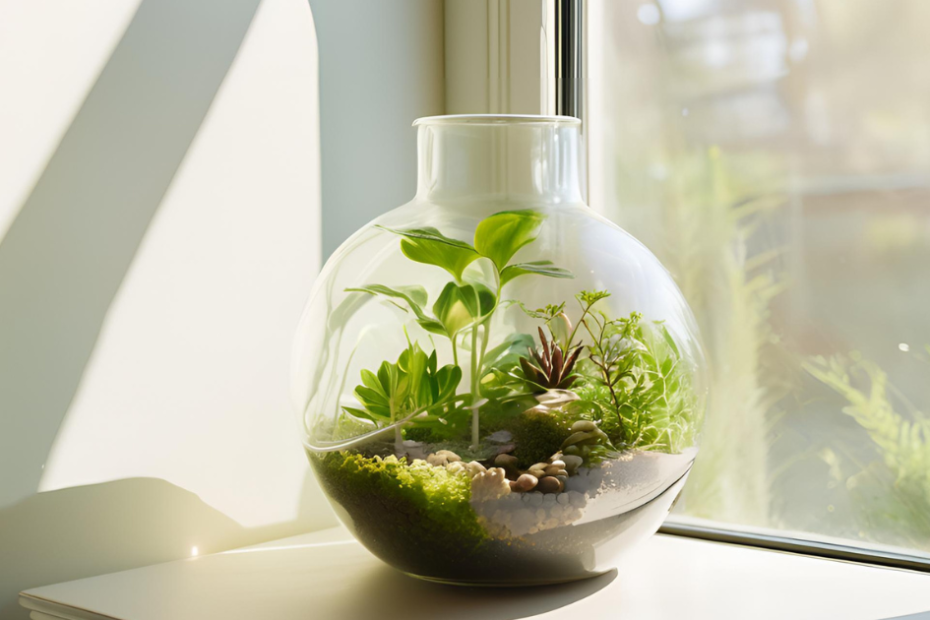Terrariums are living art—tiny worlds under glass that purify air, reduce stress, and add greenery to any space. Whether you’re a busy urbanite or a plant newbie, this guide will help you craft a self-sustaining ecosystem using IKEA jars, thrifted vases, or custom glassware. Inspired by London’s Kew Gardens and tailored for small spaces, here’s everything you need to create a terrarium that thrives.
Why Terrariums? Science-Backed Benefits
- Air Quality: Plants like ferns and moss absorb VOCs (NASA Clean Air Study).
- Mental Health: Caring for plants reduces cortisol by 14% (Journal of Physiological Anthropology).
- Design Flexibility: From desertscapes to tropical rainforests, tailor your jar to your style.
Pro Tip:
NYC designer Maria pairs open terrariums with air plants (Tillandsia) in geometric holders for minimalist desks.
Materials You’ll Need
Essential Supplies
- Glass Container:
- Closed: Mason jar, apothecary jar (for humidity lovers like ferns).
- Open: Fishbowl, geometric terrarium (for succulents/cacti).
- Drainage Layer: Horticultural charcoal + pea gravel or LECA ($12/Amazon).
- Soil:
- Succulents: Bonsai Jack gritty mix ($22/5lbs).
- Tropicals: Espoma Organic Potting Mix ($10).
- Plants: Mini ferns, baby tears, haworthia (see picks below).
- Tools: Long tweezers, spray bottle, small trowel.
Optional Decor:
- Mini figurines, quartz crystals, or preserved moss ($15/Etsy).
Step-by-Step Assembly
1. Choose Your Vessel
Style Ideas:
- Wardian Case: Victorian elegance with brass hinges ($45/Amazon).
- Hanging Orb: Macramé + glass globe for bohemian flair ($30/World Market).
Size Matters:
- Small (6” diameter): 1–3 plants.
- Large (12”+): Create layered landscapes with pathways.
2. Build the Foundation
Layer 1 – Drainage:
1” of pea gravel or LECA clay balls to prevent root rot.
Layer 2 – Charcoal:
Sprinkle activated charcoal to filter water and prevent mold.
Layer 3 – Soil:
Add 2–3” of soil mix. Slope it for visual depth!
3. Plant Selection & Arrangement
Best Plants by Type:
| Terrarium Type | Plants | Light Needs |
|---|---|---|
| Closed | Fittonia, Maidenhair Fern, Moss | Low indirect |
| Open | Echeveria, Haworthia, Air Plants | Bright indirect |
Pro Arrangement Tips:
- Thrillers: Tall centerpiece (e.g., Pilea glauca).
- Fillers: Mid-height plants (e.g., Peperomia).
- Spillers: Trailing String of Pearls or moss.
4. Planting Techniques
- Tools: Use chopsticks or long tweezers to position plants.
- Root Prep: Gently loosen roots before planting.
- Spacing: Leave 1” between plants for growth.
Design Hack: Add colored sand between plants for a “river” effect.
5. Decorate & Personalize
- Natural: Driftwood, lichen-covered branches.
- Whimsical: Mini fairy garden accessories ($8/Michaels).
- Luxury: Rose quartz chunks or amethyst geodes.
Pro Tip: Mist decorations with water + 1 drop neem oil to prevent dust buildup.
Terrarium Care 101
Watering Guide
| Type | Frequency | Method |
|---|---|---|
| Closed | Every 4–6 weeks | 2–3 sprays; condensation = enough moisture |
| Open | Every 2–3 weeks | Use a dropper to target soil (avoid leaves) |
Signs of Trouble:
- Yellow Leaves: Overwatering. Remove lid (closed) or let soil dry.
- Mold: Too humid. Wipe with diluted hydrogen peroxide (1:4 ratio).
Light & Placement
- Low Light: Closed terrariums thrive in north-facing rooms.
- Bright Light: Open desert jars love east/west windows.
- Avoid: Direct sun (magnifies through glass, cooks plants).
Tech Fix: Use Full Spectrum LED Strips ($25) for dark corners.
Troubleshooting Common Issues
| Problem | Solution |
|---|---|
| Foggy Glass | Wipe with microfiber cloth; reduce watering |
| Drooping Plants | Check for root rot; replant in fresh soil |
| Pest Invasion | Isolate terrarium; apply insecticidal soap |
FAQs: Your Terrarium Questions Answered
Q: Can I use tap water?
A: No—minerals stain glass. Use distilled or rainwater.
Q: How long do terrariums last?
A: Years with proper care! Prune overgrown plants monthly.
Q: Safe for pets?
A: Avoid toxic plants like ivy. Stick to spider plants and orchids (ASPCA list).
Q: Best plants for beginners?
A: Fittonia albivenis (dramatic but hardy) and Haworthia (forgives neglect).
Where to Buy Supplies (US Focus)
- Containers:
- Terrain: Handblown glass terrariums (50–50–150).
- IKEA: SOCKER Greenhouse ($20).
- Plants:
- Mountain Crest Gardens: Succulent packs ($15).
- Etsy: Search “terrarium plant kit”.
Pro Design Inspiration
Modern Zen: White pebbles + single Jade Plant in a geometric vase.
Desert Oasis: Sand, zebra stones, and Lithops in an open bowl.
Mossarium: Layer Sheet Moss over driftwood in a sealed jar.
Read also: Organic Home Garden: Step-by-Step 2025 Guide for Beginners
